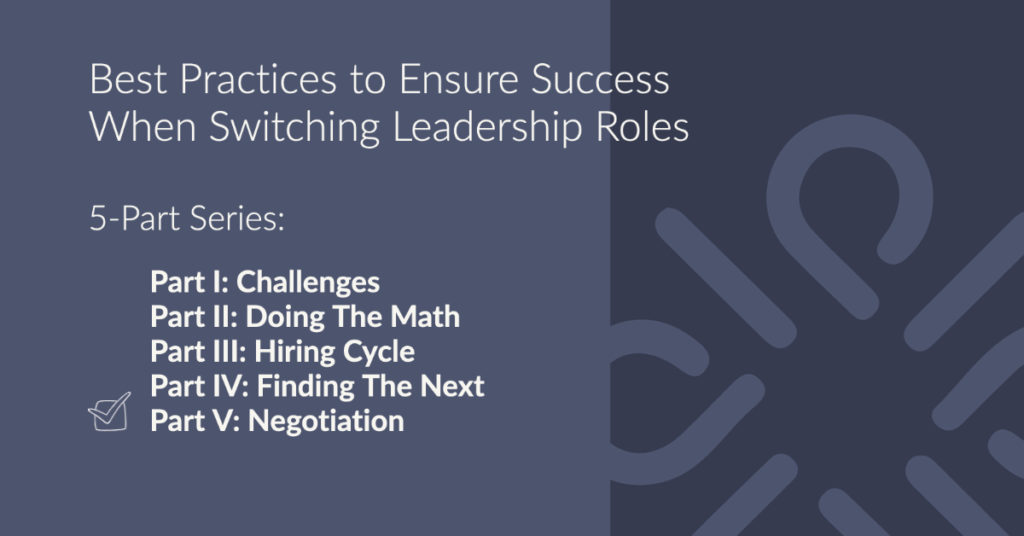Part V – Leadership Negotiation is part of a five-part series
Together in this series, we’ve covered several critical topics that we recommend marketing leaders examine before preparing to switch roles, topics including:
- Part I: Top challenges when switching leadership roles + common 401(k) and profit-sharing plan structures
- Part II: The best time to leave your current role
- Part III: The hiring cycle
- Part IV: Finding your next professional position
Now, in Part V of Best Practices to Ensure Success When Switching Leadership Roles, we will share one additional crucial topic: negotiation.
The Compensation Package
Base Salary
Base salary is the core component of your total compensation. Beyond usually being the biggest piece to the total compensation pie, it is vital because it’s often taxed differently than bonuses or other financial compensation components.
With that said, it’s essential to look at the total package including profit sharing, bonus options, and any other financial incentives when assessing full compensation. Understanding total compensation will help you ensure you never leave money on the table.
Beyond base salary, we recommend investigating how your potential employer evaluates bonuses, raises, and other incentives. All of these financial incentives will influence negotiations and base salary needs.
Signing Bonus
There are generally three reasons why a company will offer a signing bonus:
- To win you away from their competition.
- To compensate you for foregone income (i.e., you’d lose your expected bonus or other benefits by leaving your current position).
- To compensate for a salary that is above their upper limit for the position.
It’s the second bullet point that should be of particular interest to you: Negotiation tactics around signing bonuses can reduce or eliminate potential loss of earnings based on your current 401(k) or profit-sharing payout structure.
Other Incentives & Benefits
A successful negotiation strategy should employ a holistic approach that explores all the financial aspects of the offer. Additional financial incentives may include:
- Annual incentives
- Bonus incentives
- Commission
- 401(k) matching
- Company equity and stock (e.g., profit sharing)
- Company car
- Personal time off (PTO) allotment
- Health, dental, and vision coverage
- Supplemental executive medical and life insurance
- Executive retirement plan
- Health and wellness stipends
- Tuition reimbursement for yourself and/or a dependent
- Memberships and subscriptions
- Training and certifications
If there’s an incentive that’s a deal-breaker or maker for you, don’t be afraid to communicate your request. When you decide to leave your current position, you are taking a calculated risk. So, minimizing your risk by ensuring the role and company are a good fit and that the offer meets your needs is essential.
Now, let’s continue into the part you’ve been waiting for: negotiation tactics.
Leadership Negotiation Tactics
When you have an offer in hand is when you might consider negotiation. Following are four strategic leadership negotiation tactics to consider.
Know What’s Most Important to You
Before you begin interviewing, create and have an outline that defines your compensation expectations beyond salary. When you’re clear on what’s most important to you, you’ll ensure you stay focused when negotiations begin. Share these requirements from the very start of negotiations, this focus will showcase your transparency and build trust with your potential employer. Remember that leadership negotiation is an art, not a science, and stay focused on your non-negotiables to ensure the outcome will meet your needs.
Project a Confident, Collaborative Tone
Negotiation is more than ensuring you get what you want. You should expect to negotiate; however, the potential employer needs to see collaboration and a win-win mentality in the negotiation process. Make sure you work to create a “win-win” scenario that makes the potential employer feel valued and shows that you are willing to concede fairly, if necessary. More than anything, this means honing your collaborative tone and attitude – not giving up on your needs but also not trying to be a bulldozer.
Practice Patience
Take your time to review the offer, the full compensation package, and create a well-informed response rather than a quick, impulsive counter. Once you decide to counter, remember that the organization needs time to consider your request. Attempting to push a hiring organization into a quick response to your counter isn’t the best way to maintain your offer or get what you need. Remember, nobody at the negotiating table wants to feel regret due to pressure on either side.
To Give or Not-give the Number First In Leadership Negotiation
Making the first offer defies the conventional wisdom of not showing your cards. But research proves that the first number shared sets the stage and is the price used in the consideration process.
Key decision-makers often discuss your salary requirements before the actual offer. And most experts agree that you’ll be in the best position to negotiate your salary after you have an initial offer. The first salary offer a company makes is usually not their best offer. So when you receive an offer, don’t feel like it has to be a final offer.
We hope this five-part series provided the information you were seeking to support your decision to stay in your current role or begin the process of switching roles. If you are still on the fence about changing positions or have specific questions that we haven’t answered, feel free to reach out to us directly. We’re here to help – and we love what we do.
Read the entire series –
Parts I: Challenges | II: Doing the Math | III: Hiring Cycle | IV: Finding the Next | V: Negotiation
Looking to connect regarding new opportunities or a hiring need? Contact us today!

